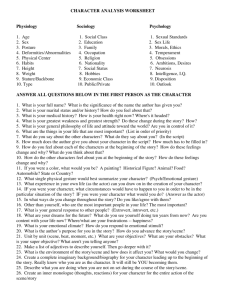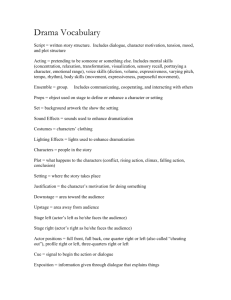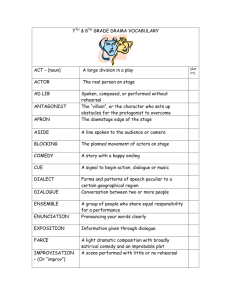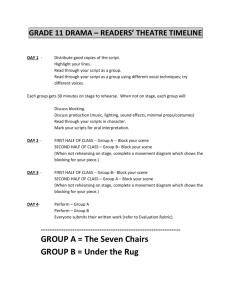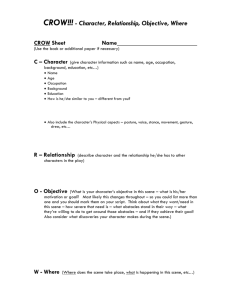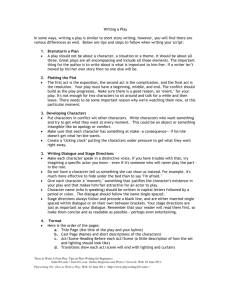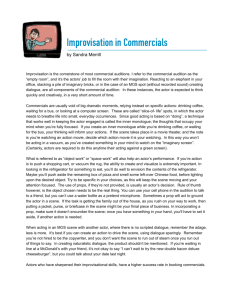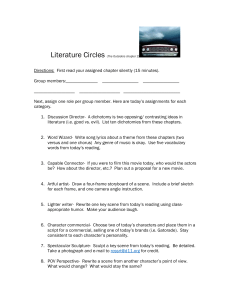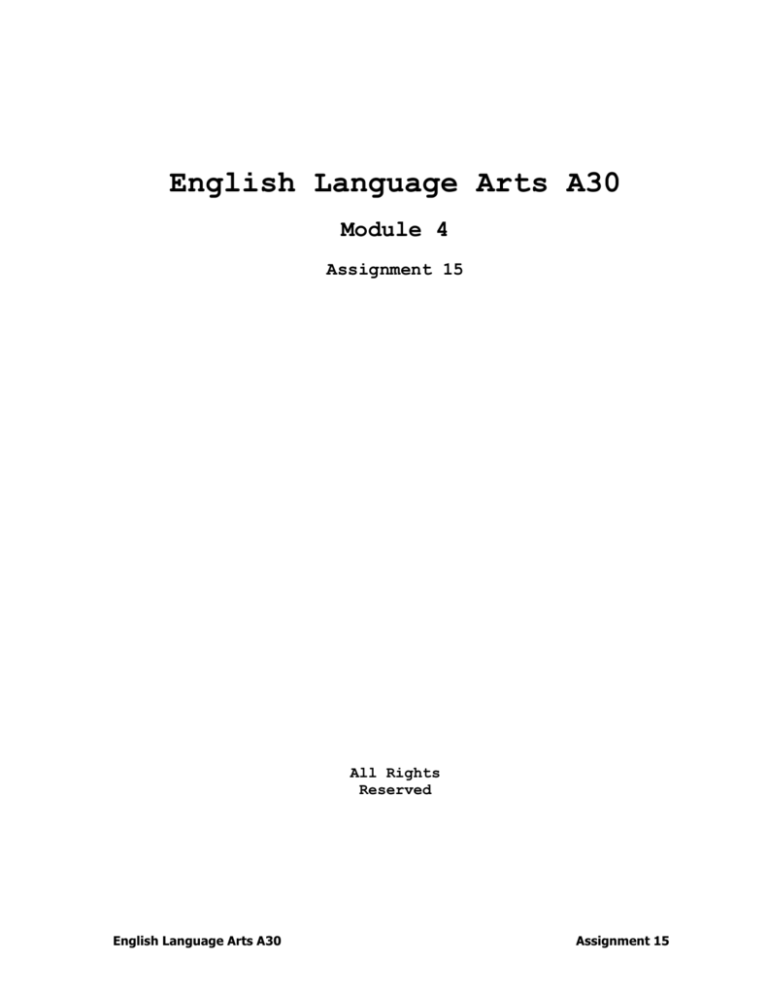
English Language Arts A30
Module 4
Assignment 15
All Rights
Reserved
English Language Arts A30
Assignment 15
English Language Arts A30
Assignment 15
Assignment Fifteen
(15)
A.
Response Journal
1. Submit your response journal pages from Lessons Thirteen,
Fourteen, and Fifteen.
.
Lesson Thirteen
Marking Scale
No entries
Inadequate entries.
Ideas not clear.
Ideas are limited and over
generalized though some
insight is apparent.
Ideas are straightforward
and clear yet
commonplace and
predictable.
Ideas are thoughtful,
clear, insightful, and well
considered.
Lesson Fifteen
No entries
Inadequate entries.
Ideas not clear.
Ideas are limited and over
generalized though some
insight is apparent.
Ideas are straightforward
and clear yet
commonplace and
predictable.
Ideas are thoughtful,
clear, insightful, and well
considered.
0
1
2
3
4-5
Lesson Fourteen
Marking Scale
No entries
Inadequate entries. Ideas
not clear.
Ideas are limited and over
generalized though some
insight is apparent.
Ideas are straightforward
and clear yet
commonplace and
predictable.
Ideas are thoughtful,
clear, insightful, and well
considered.
0
1
2
3
4-5
0
1
2
3
4-5
Teacher’s Comments
English Language Arts A30
Assignment 15
(10)
B.
Language of Drama
In Lesson Fifteen you were introduced to a number of theatrical terms.
In order to use them effectively when writing or speaking, you need to
be clear about the meanings of these terms. If necessary review
Lesson Fifteen to help you complete the following crossword puzzle.
Across
2. areas to either side of a stage
4. the written form of a play
9. character expressing his feelings to an
audience
12. subdivision of an act in a play
14. the actors in a play
17. a theatrical performer
19. writing dialogue and stage directions
20. stage action imagined by a reader
English Language Arts A30
Down
1. division of a play which contains several
scenes
3. specialized lighting used on stage
5. objects used on stage to create realism
7. action takes place inside
6. a signal to actors or crew
8. slow or sudden change in lighting
10. area behind or to the sides of a stage
11. the very back of the set
13. action takes place outside
15. story of the play
16. part of the theatre where the play is
enacted
18. communication between characters in a
play
Assignment 15
(30)
C.
Elements of Toronto at Dreamer’s Rock
In Lesson Fifteen you were given a chart to help you consider the
elements of Toronto at Dreamer’s Rock that contribute to the play’s
overall effect. You were to use the chart in the lesson as an organizer
for your reactions and thoughts and as a first draft for the one you will
now do. Complete the following Elements of Toronto at Dreamer’s
Rock chart using complete sentences.
Elements of Toronto at Dreamer’s Rock
Subject of play
Overall tone of play
Setting
Significance of setting
Main character
Two dominant traits of main
character
How these dominant traits
emerged throughout the play
English Language Arts A30
Assignment 15
Two problems faced by main
character
Solutions of main character's
problems
Other characters in the play and
their roles. (How did they help,
hinder, or support the main
character?)
Plot (Basic sequence of events)
English Language Arts A30
Assignment 15
Climax of the play
Theme
Significance of theme
Teacher's Comments
English Language Arts A30
Assignment 15
D.
“What’s in a Name?”
You will now listen to an opinion piece by the dramatist of the play you read in
Lesson Fifteen called “What’s in a Name?” In this piece, Drew Hayden Taylor,
discusses a problem he has when his play Toronto at Dreamer’s Rock is produced
in Western Canada.
As you listen
(6)
As you listen to Taylor’s piece, note the information asked for in the
following chart. Use point form.
Introduction
What is the topic and the speaker's purpose for this presentation?
Body
What are the speaker's main points?
Conclusion
What is the speaker's conclusion?
English Language Arts A30
Assignment 15
After you listen
(2)
In a sentence or two explain why or why not Taylor’s opinion is
reasonable.
(2)
piece.
List two questions you have for Taylor after listening to his opinion
E.
Being a Playwright, Producer, Director, and
Actor
Despite the growing urbanization of our province, farming is still a big
part of the prairie culture. The play Roundup by Barbara Sapergia
takes a look at this culture which is in crisis and at an extended family
who loves the land and its way of life.
Read the excerpt from the play Roundup which is found in your
anthology Sundog Highway. You will be introduced to three
characters: Paul, Verna, and Darcy. Although the excerpt from the
play is short, you will learn quite a bit about each of these three
characters. Take note of their personalities and their ways of
speaking. Take note also as to what is going on in these characters’
lives in this excerpt.
Be sure to read the author’s biography and statement which is found in
the back pages of the anthology.
Now it is your turn to act as a playwright, director, producer, and actor.
Imagine that the excerpt you read in your anthology is part of a serial
that is presented on the radio over a series of days or weeks. The
excerpt is one instalment of this series.
English Language Arts A30
Assignment 15
Now, use your imagination and creativity to write the next instalment or
scene to the excerpt of Sapergia’s play Roundup. Then record this
scene by yourself or with the help of others. Do not send in the written
version of your scene.
Preparation for Writing the Script
1. Think about your purpose and your audience.
2. The scene does not have to be a long one. It should be
approximately five to seven minutes in length.
3. Writing the script is the next step. Although playwriting is a creative
process, you can employ the same writing strategies you use when
writing a paragraph or an essay.
Pre-writing
Drafting
Revising (editing)
The complete play and the excerpt from a play in this lesson and
assignment may serve as models for you as you write your scene.
Pre-writing
1. You have three characters already established: Paul, Verna, and
Darcy. Darcy’s boyfriend, Greg, has also been mentioned as well
as a man named Flint who wants to buy the farm. You have some
options here as to which characters you want to use in the scene
you will script.
Use only the three characters: Paul, Verna, and Darcy.
Use only two characters, for example: Paul and Verna or Darcy
and Paul, or Darcy and Verna, or Darcy and Greg, or Paul and
Flint and so on.
Use three characters: two who have already been mentioned
and introduce a new character.
Keep in mind that certain things have been already established
about Paul, Verna, and Darcy. You cannot suddenly change their
characters and ways of thinking in the very next scene.
2. Your task is to advance the plot of this play. Think about what you
already know after reading the excerpt two or three times. In the
excerpt certain things have been established. Take the action
further.
How are you going to continue this story?
What do you want to have happen next?
English Language Arts A30
Assignment 15
You are not expected to bring this play to a conclusion. What you
are expected to do is add another chapter to this story or another
episode to the radio serial. For example, you may choose to have
Verna and Paul decide to turn their farm into a petting zoo which
may take the story off into a humorous direction or you may wish to
keep the story on a serious note. The choice is yours.
3. End your scene with an element of suspense. We do not know
what is going to happen to the farm family at the end of the excerpt
in the anthology. The excerpt has left us wondering what will
happen next. What will Paul and Verna do? All we know is that
they are going to stay on the farm and “give it a try.” What will
Darcy do? Will she get married? Will she and Greg move into the
old folk’s place? Will they decide to give up farming? There are
many possibilities.
Drafting
Before beginning to write the first draft of your script, you may wish to
review the Glossary of Drama Terms in Lesson Fifteen so that you
are familiar with the terms characterization, dialogue, scene, stage
directions, and so on.
1. As you write the script, remember that this scene is to be performed
on tape. Remember it is a part of a radio serial. The only way your
audience is going find about the characters and plot is through the
dialogue you write. You, as the playwright, will want to include
stage directions in the script to help you, the director and actor, but
these stage directions are not to be heard by your audience. You
may wish to include sound effects and music if these will help you
tell the story.
English Language Arts A30
Assignment 15
Revision
Even though you will not be sending in your written script, you still need to
go through the process of revision. Edit your script. As you go through
the draft, look for the following aspects.
Have you maintained a consistency in each character’s dialogue? For
example, if you have used Paul as a character he should not suddenly
start speaking like a Shakespearean actor unless there is a very good
reason for it.
If you have introduced a new person, the dialogue in the script must
reveal his or her character. Does the dialogue in your scene do this?
Is the dialogue easy to speak? In your actor’s role you will appreciate
dialogue that is easy to speak.
Is the diction appropriate to the characters? The words the characters
use need to be appropriate to the culture they live in.
Have you advanced the plot? Is there enough action in the scene you
have written to keep your audience interested? Does the scene make
sense? Does it evolve naturally from the excerpt?
Is the scene too short or too long? Avoid unnecessary repetition. A
playwright does not have the luxury of time. A story must be told in a
set amount of time. Bear in mind, however, that a scene cannot be too
short, either. Your listener will need enough information to understand
the plot and the characters.
Does the scene have a definite focus or have you tried to include too
many events or details?
Does the scene have one setting?
English Language Arts A30
Assignment 15
Performance of Scene
You have written and revised your script. Your work as a playwright is
now over. Next, you will put on the hats of the producer, director, and
actor as you record the scene.
Performance
1. Rehearse your scene. All plays, whether presented on stage,
television, or radio are rehearsed before they are presented to an
audience. As the director, it is your job to see that the scene is well
rehearsed.
2. Use your own voice to introduce the scene. For example, you
might say, "Good evening. Tonight we will hear the next installment
of the play Roundup. In this presentation you will hear Tom Jones
play the part of Paul, with Holly Golightly as Verna. This scene
takes place in Verna and Paul's kitchen. Now here is the third
installment." (Note that the setting of the scene is mentioned.)
3. When presenting the scene you have two options.
You may act all the parts, differentiating your voice to make
clear the different characters.
You may have a friend(s) or a family member(s) join you and act
one or more of the parts.
As the director, you make the choices about the types of voices you
want in this scene. If you are using other “actors,” it is your job to
direct these people. Give them guidance as to how you want the
scene to go and what you want your characters to sound like. As
the director you are also in charge of the stage directions so if
sound effects are important to indicate action, such as the
slamming of a door, make sure these are included. Music can be
used effectively to create mood in the scene.
English Language Arts A30
Assignment 15
Remember: Only the dialogue (and sound effects and music) is to
be heard on the recording. The stage directions are not to be
included in the presentation nor are you to preface each piece of
dialogue with “ "Paul:" or "Darcy says."
English Language Arts A30
Assignment 15
4. Now wear two hats – the director’s and the producer’s—as you
listen to the presentation. Use the evaluation chart which follows to
help you evaluate your scene. Only when you are satisfied with the
presentation, (this could mean re-recording) enclose your tape with
this assignment for submission.
Your script and performance will be evaluated according to the criteria
given in the following two charts: 10 marks for the script; 10 marks for
the performance.
(10)
Requirements of Script
Consistency of
characterization
Script
Teacher's Comments
Plot evolves naturally from
the excerpt
Plot has been advanced in
an interesting manner
Appropriate diction is used
Scene is of appropriate
length
Scene has a definite focus
English Language Arts A30
Assignment 15
Performance
The presentation of your scene is worth 10 marks.
Poor: 1-3 marks
Satisfactory: 4-7 marks
Good: 8-10 marks
Presentation
Poor
Satisfactory
Good
Volume
Actor(s) voices are
too loud or too soft
Actor(s) voices are
usually loud
enough
Actor(s) are easily
heard with voice(s)
loud or soft as
required
Articulation
(clarity of
pronunciation)
Actor(s) mumbling
or monotone
Actor(s) usually
understandable
Actor(s) are clear,
easily understood
Pacing (rate and
pauses)
Actor(s) speak too
quickly or too
slowly
Actor's speed is
usually good
Actors have good
speed, going fast
or slow to fit
material
Expression (tone)
Actor(s) use little or Actor(s) use some
no expression
expression
Presentation
Actor(s) have
uncertain or
confused delivery
Actor(s) are usually Actor(s) have
in control
strong, purposeful
presentation
Music and/or
sound effects
Inappropriate
Usually appropriate Used effectively
Actor(s)
consistently
express
appropriate feeling
Teacher's Comments
English Language Arts A30
Assignment 15
(15)
F.
Vocabulary Building
Why use two words when one will do? To be an effective
communicator, you should strive for conciseness and avoid
redundancies in your speaking and writing. A redundancy is a
way of unnecessarily saying the same thing twice.
Redundancy, or tautology as it is sometimes called, is not an
error in grammar, but if it is not a deliberate repetition for
effect, it is an error in expression. For example:
Redundant: He had a way of keeping my attention by the way he
raised and lowered his voice on every single word he spoke.
Concise: He kept my attention by raising and lowering his voice when
he spoke.
In the following sentences, find the redundancy in each and cross it out
concisely correcting the problem of expression.
1. When we found the room filled with flies and mosquitoes, we
sprayed a strong insecticide and killed them all dead.
2. The detective solved the case when he interviewed the suspect and
discovered the true facts.
3. Even though the lights distorted the shadows, we knew the flowers
were red in colour.
4. Some people they don’t use their voices as well as they could.
5. Because the painting had been hanging in the same place on the
wall for so long, it left a mark which was square in shape.
6. The dead corpse was found by police under some bushes in the
park.
7. Through the clouds and rain, the damaged airplane was just visible
to the eye.
8. Soccer first originated in Europe.
9. People in today’s society need to communicate together.
10. At the age of eleven years old, Mozart composed his first opera.
11. I have already told you once, and I do not want to have to repeat
it over again.
English Language Arts A30
Assignment 15
12. I am sure that we can accomplish our goal as long as we all cooperate together.
13. Although the base of a pyramid is usually square, each face is
triangular in shape.
14. The young man, expecting to be the father of twins, was surprised
and delighted when his wife gave birth to three triplets.
15. After several months of practice with an instructor, Julie finally
made her first solo flight alone.
English Language Arts A30
Assignment 15

